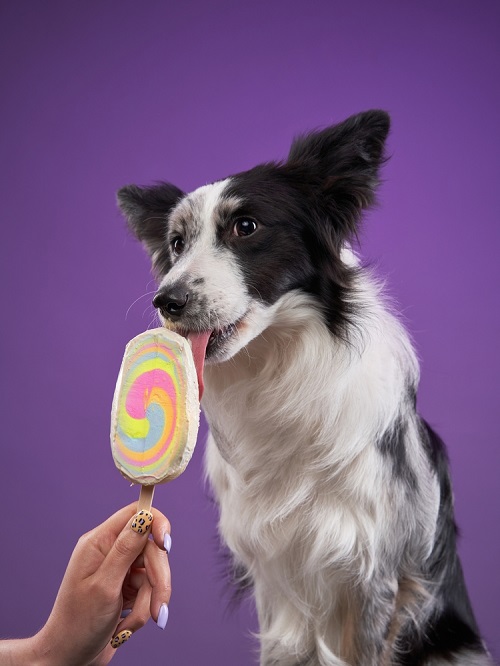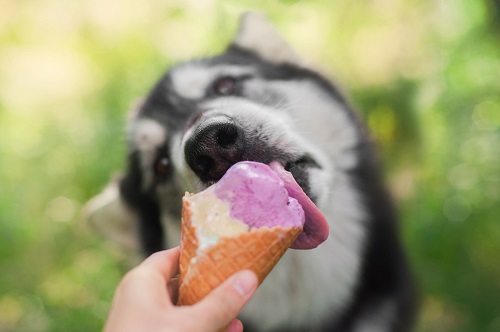Can Dogs Eat Ice Cream? Can your furry friend indulge in this icy treat, or is it a no-go? Read on to know about it!
Can Dogs Eat Ice Cream? Are there any health benefits it offers? Will it be a good idea to feed it to your pup on a daily basis? Well, it is time to find out!
What is Ice Cream?

Ice cream is a frozen dessert typically made from a mixture of cream, milk, sugar, and flavorings such as vanilla or chocolate. The ingredients are combined and churned to incorporate air, creating a smooth and creamy texture.
Ice cream can be enjoyed on its own or as a topping for other desserts, and it comes in a wide variety of flavors and styles, such as sorbet, gelato, and soft serve.
Check out Can Dog Eat Strawberry Ice Cream? here
Can Dogs Eat Ice Cream?
So, Can Dogs Eat Ice Cream? They can, but it’s not recommended to feed them this treat regularly or in large quantities. This is because ice cream contains sugar, which can cause dental problems and contribute to obesity. It may also contain other ingredients that can upset a dog’s stomach, such as lactose if the dog is lactose intolerant.
Are they Safe for Dogs?
Ice cream is not necessarily safe for dogs. While small amounts of plain vanilla ice cream may not harm most dogs, many commercial ice cream brands contain ingredients that are not safe for dogs.
Chocolate, for example, is toxic to dogs, and some ice cream flavors may also contain xylitol, which is a sweetener that is extremely toxic to dogs. Additionally, many dogs are lactose intolerant and can experience digestive issues after eating ice cream.
Check out Is French Toast Safe for Dogs? here
Health Benefits of Ice Cream For Dogs

- There are not many health benefits of ice cream for dogs.
- Ice cream is not a necessary or recommended part of a dog’s diet.
- Many commercial ice creams contain ingredients that can be harmful to dogs, such as sugar and lactose.
- Ice cream may provide a small amount of calcium and protein, but these nutrients can be obtained from other, more nutritionally balanced sources.
- It’s generally best to avoid feeding ice cream to dogs, or to only offer it in small amounts as an occasional treat, and to choose a plain, vanilla flavor with no added sugars or other potentially harmful ingredients.
A Few Health Concerns
- Digestive issues: Ice cream can be difficult for some dogs to digest, especially those who are lactose intolerant. This can lead to diarrhea, vomiting, and other digestive issues.
- Obesity: Ice cream is high in calories and sugar, which can contribute to obesity and related health problems such as diabetes and joint issues.
- Dental problems: The high sugar content in ice cream can also contribute to dental problems in dogs, such as cavities and tooth decay.
- Toxic ingredients: Many commercial ice creams contain ingredients that are toxic to dogs, such as chocolate, xylitol, and macadamia nuts.
- Allergies: Some dogs may be allergic to ingredients in ice creams, such as dairy or certain flavorings. This can cause a range of symptoms, including itching, hives, and difficulty breathing.
Check out Can Dogs Eat Sour Cream? here
Types of Ice Creams that are Safe For Dogs
- Dog-friendly ice cream: Some companies produce ice cream that is specifically made for dogs. These ice creams are often formulated with dog-safe ingredients, such as peanut butter or yogurt, and are lower in calories and sugar than traditional ice cream.
- Homemade ice cream: You can make your own dog-friendly ice cream at home using ingredients such as plain yogurt, unsweetened applesauce, and mashed bananas.
- Plain vanilla ice cream: If you choose to give your dog regular ice cream, plain vanilla is generally the safest option.
- Sorbet: Sorbet is a frozen dessert that is typically made with fruit juice or puree and sugar.
Types of Ice Cream Bad for Dogs
- Chocolate ice cream: Chocolate contains theobromine, a compound that is toxic to dogs. The amount of theobromine in chocolate ice cream may not be as high as in pure chocolate.
- Coffee ice cream: Coffee contains caffeine, which is also toxic to dogs. Consuming caffeine can cause restlessness, rapid breathing, heart palpitations, muscle tremors, and other symptoms in dogs.
- Ice cream with artificial sweeteners: Some ice creams are sweetened with artificial sweeteners such as xylitol, which is highly toxic to dogs.
- Ice cream with nuts: Some nuts, such as macadamia nuts, can be toxic to dogs and cause symptoms such as vomiting, tremors, hyperthermia, and weakness.
- Ice cream with raisins: Raisins and grapes are toxic to dogs and can cause kidney failure. It’s important to avoid ice creams that contain raisins or grapes, as well as any other products that may contain these ingredients.
Check out Are Currants Good for Dogs? here
Dog Ice Cream Alternatives
- Frozen yogurt: Plain, unsweetened yogurt can be a good source of protein and calcium for dogs. You can freeze it in small portions for a cool and refreshing treat.
- Frozen fruit: Many fruits are safe for dogs and can be frozen for a tasty and healthy treat. Some good options include sliced bananas, strawberries, blueberries, and watermelon.
- Frozen vegetables: Some vegetables can also be frozen and served as a healthy snack for dogs. Try freezing green beans, carrots, or sweet potatoes for a crunchy and refreshing treat.
- Homemade dog treats: You can make your own dog treats using ingredients such as peanut butter, pumpkin, and oats. There are many recipes available online for homemade dog treats that are safe and healthy for dogs.
- Commercial dog treats: There are many commercially available dog treats that are designed to be healthy and safe for dogs.
Dog-Friendly Ice Cream Recipe
Here’s a simple recipe for dog-friendly ice cream that you can make at home:
Ingredients:
- 2 ripe bananas
- 1 cup plain Greek yogurt
- 1 tablespoon honey
- 1 teaspoon vanilla extract
- 1/2 cup peanut butter
Instructions:
- Peel and mash the bananas in a bowl.
- Add the Greek yogurt, honey, vanilla extract, and peanut butter to the bowl and mix well.
- Pour the mixture into a blender or food processor and blend until smooth.
- Pour the mixture into ice cube trays or small paper cups and freeze for several hours or until firm.
- Pop the ice cream out of the ice cube trays or cups and serve to your dog as a treat.
- This recipe is easy to make and contains ingredients that are safe and healthy for dogs, such as bananas, Greek yogurt, and peanut butter.
Check out Is Peanut Butter Safe for Dogs? here
Safe Way to Feed Ice Cream to Dogs

- Choose a plain vanilla flavor without any added sugars or artificial sweeteners.
- Feed your dog a small amount of ice cream, such as a tablespoon or less, and monitor them for any signs of discomfort or adverse reactions.
- Consider giving your dog a specially formulated dog-friendly ice cream or frozen treat which is made with ingredients that are safe and healthy for dogs.
- Never feed your dog ice cream that contains ingredients that are toxic to dogs, such as chocolate or xylitol.
- Avoid feeding your dog ice cream too frequently or in large quantities, as this can contribute to weight gain, dental problems, and other health issues.
- Remember that ice cream is not a necessary or recommended part of a dog’s diet, and there are many other treats and snacks that are safer and healthier for dogs.
Quick Takeaways
So, Can Dogs Eat Ice Cream? Dogs can eat ice cream, but it’s not recommended to do so regularly or in large amounts. Many commercial ice creams contain harmful ingredients such as sugar, lactose, and toxic additives. However, plain vanilla or specially formulated dog-friendly ice cream can be given in moderation as an occasional treat.
